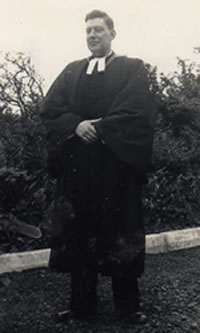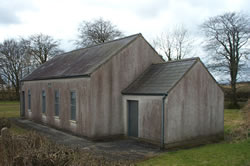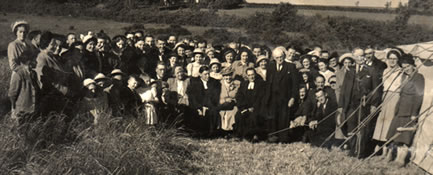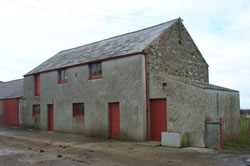The Foundation of the Work
In the days before the commencement of a Free Presbyterian witness, the spiritual climate in most Presbyterian churches in the Ballymoney area lacked vibrancy. Although the majority of people attended church regularly on a Sunday morning, Christians found their spiritual food in Prayer Union meetings and other Faith Mission activities. Most of the Christians in Drumreagh Presbyterian Church had been saved through the ministry of the Faith Mission. They held missions in tents and Orange Halls, which were usually packed to capacity. It was at such a mission that Mr. Sandy McAuley's two sons, Ansy and Billy, were saved. This had a great impact on the life of Mr. McAuley and led to his attendance at the mission in Eden Orange Hall where he, too, found Christ as Saviour. Following his conversion Mr. McAuley held cottage meetings in his home where the Gospel was preached faithfully each Sunday evening. There were other cottage meetings held in the Cabra area too.

The McAuley family attended Drumreagh Presbyterian Church where Mr. McAuley was the Clerk of Session. When strong allegations arose about the immoral conduct of the minister of that congregation, Sandy was approached about the matter by some church members. He felt that he should visit the minister to inform him that such rumours were in circulation. The minister adamantly denied all allegations and indeed treated Mr. McAuley as if he were the accuser.
Sometime later he arrived at the McAuley farm with two of his elders. It was clear to Mr. McAuley that he was in an inebriated state. The minister, who was reputed to be something of an amateur boxer, beat Sandy brutally and left him battered and bleeding. His daughter, Miss Sadie McAuley, remembers seeing her father later that evening and hardly being able to recognise him because of the swelling and bruises on his face.
Not surprisingly, when Mr. McAuley and other Cabra men heard Rev. Ian Paisley's powerful preaching in Crossgar, they too longed for a mission in their own area. They arranged for the campaign to be held in the old schoolhouse. It was from that mission that the Free Presbyterian Church in Cabra would be formed. 
1951 Cabra Mission
The third congregation of the Free Presbyterian Church of Ulster at Cabra, Ballymoney was formed as a consequence of a six-week Gospel mission conducted by Rev. Ian Paisley. The mission took place against a general background of spiritual apostasy in Presbyterianism and a particular corruption in the local congregation.
Many of the Christian men from the Cabra area realised the necessity of having the old, old story of the Gospel preached in the power of the Holy Ghost, and, confident of the Lord's guidance, took the step of bringing Rev. Paisley for a mission.
At this time the young twenty-four-year-old's reputation as a great soul winner was growing rapidly and so the invitation was extended to him to conduct the Gospel campaign.
Mr. Paisley arrived in April 1951 to the Cabra Schoolhouse where Mr. Sandy McAuley had conducted an afternoon Sunday School for many years. During the mission he stayed in Mr. McAuley's home.
Mr. Bob Scott, a young convert full of fire, often accompanied Mr. Paisley during the mission and did visitation around the homes in the area. Later he became a missionary. Another zealous young teenager who travelled with Mr. Paisley on occasions to the mission was Mr. John Douglas. He testified at the mission. Sometimes he came by motorcycle and arrived in a very wet state!
Large posters for the mission were displayed around the area, including sermon titles such as "Three men going to hell, all living in the Ballymoney district." This title led to great speculation as to who the three men were and as a result, the schoolhouse was packed with as many people standing outside as were seated inside. A local man, Mr. Samuel Chestnutt, brought a tractor and trailer filled with people eager to hear. One of those on board was twelve-year-old Marshall McDermott, accompanied by his mother. Marshall 's connection with the Free Presbyterian witness was to continue for many years until his sudden home calling in June, 1988.
All the windows in the school were open and there was a queue of people at each window. There was no problem hearing the young and fiery Mr. Paisley even from outside. In those days an amplification system for preaching was a rarity. Mr. Hugh McAuley, Sandy 's son, was ill at this time and was unable to attend the mission, yet he was able to hear the preaching clearly from his bedroom, approximately ONE MILE away!!
From the beginning, this was a great mission with the power of God abundantly manifested. In all one hundred people found Christ as Saviour in the campaign.
There were special times of prayer after the Gospel meetings, some of which continued until the early hours of the morning. It was hard to break up these prayer times but because of the attendance of the women it was felt it was best to go home. Some went home but left their doors open in case souls would come seeking the Lord, such was the expectation of great blessing. The presence of the Lord was so evident that it was felt that revival was on the way.
One of the souls saved at the mission was Mrs. Sarah Blair, sister of the late Mr. William Stevenson. What a change this made in her home. Mrs. Blair became a great helper in the newly formed Free Presbyterian Church.
All Night Prayer Meetings
After the success of the mission in the Cabra Schoolhouse, concern was expressed about the young converts having to return to worship in churches that were not strongly evangelical in outlook. The possibility of starting a Free Presbyterian Church was discussed but no firm decision was made. Instead a night of prayer was held in Mr. Sandy McAuley' s home. At midnight some went home but the rest continued at the Throne of Grace until the morning. Further consideration was then given to the matter with Mr. William Stevenson being very anxious to proceed. Standing on the mat in front of the fire, Mr. Stevenson wagged his finger and spoke loudly: 'We will have to take our stand!' About 7.00 a.m. the group of men went out into the garden and it was there that the decision was taken, before God, to commence a Free Presbyterian congregation. This was not an easy decision as many were involved in Sunday School work in their own church. Mr. McAuley was Superintendent of the Sunday School and had a well-attended Bible Class in Drumreagh Presbyterian Church. However the Lord gave Mr. McAuley a wonderful promise from Job Chapter 8 verse 7: 'Though thy beginning was small, yet thy latter end should greatly increase.'
Soon the news about the secession spread. There was great opposition from the Presbyterian Church. An attempt was made to get the men involved to revoke their decision but they were 'steadfast, unmoveable, always abounding in the work of the Lord.
Commencement of Cabra Free Presbyterian Church
On Saturday, 23 rd June, 1951 at 3.30 p.m. Cabra, the third congregation of the Free Presbyterian Church, was officially constituted.
The meeting place was a large tent erected in Mr. William Stevenson's field just beside the old Schoolhouse. Originally the plan was to start the church in the Schoolhouse where the mission had been held. When it became clear that the people were seceding from the Presbyterian church to form a Free Presbyterian congregation, the old school building was closed to them.
The tent, holding about four hundred people, was well filled for the constitution service. Just before the sermon, Rev. J.G. Leitch MA and Rev. W. J. Hemphill BA, ministers of the Route Presbytery, arrived 'to spy out the land.' They looked very bewildered as they saw the huge crowd gathered and seemed not too comfortable as they had to take their seats directly below the platform, such was the large crowd. During the service, when the congregation shouted a hearty 'hallelujah,' they joined in the shout, carried away perhaps by the intense zeal of the people.

Rev. Ian Paisley delivered the constitution sermon. He spoke powerfully against modernism, apostasy and the World Council of Churches. He also spoke out against Professor Davey who denied the Virgin Birth of Christ and who had been acquitted, in 1927, of heresy charges by the General Assembly of the Irish Presbyterian Church. This was followed by prayer when the whole future of the work in Cabra was committed into the hands of the Lord Jesus Christ, the great King and Head of the Church. Then Mr. James Atkinson, Mr. Alexander McAuley, Mr. William Stevenson and Mr. Albert Hanna, the seceding elders, answered the prescribed questions and subscribed to the Confession of Faith. They were inducted into their offices and given the right hand of fellowship by Rev. George Stears and Rev. Ian R. K. Paisley.
Rev. Stears then delivered a solemn charge to the elders and congregation. The service, which lasted for two hours, was brought to an end by prayer and the benediction offered by Rev. J. Kyle Paisley from Ballymena. A sumptuous tea was then served by the ladies of the congregation.
After the tea, greetings to the new congregation were conveyed from the other congregations of Ravenhill and Crossgar and from friends in Ballymena, Dundonald and Rathfriland.
For the fledging congregation that Saturday was a day to be remembered in the history of the work. The people rejoiced, knowing that the Lord was with them.
The "HOLEY" Tent
Next day the congregation gathered in the tent for morning worship. About two hundred people were in attendance. It was an unusual morning service for the tent Mr. Paisley had brought was a 'holey' one, that is, it was full of holes. Rev. Paisley conducted the opening Sabbath service. God blessed their time of worship, not only with showers of rain, but more importantly, with showers of blessing.

The Barn Loft
After lunch the decision was made to move for the evening service to Mr. William Stevenson's barn loft that held about one hundred people. The barn was cleared and seated with the chairs from the tent. At the service four souls came to Christ.
The congregation continued to grow and by September of that year it was reported in the 'Revivalist' magazine that membership stood at seventy-five with an average attendance of one hundred people in the morning and more in the evening of each Lord's Day.